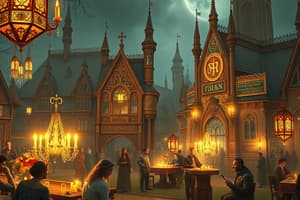Podcast
Questions and Answers
What is the primary function of the primary sector in the Three Sectors of Production?
What is the primary function of the primary sector in the Three Sectors of Production?
- Distributing finished products
- Transforming raw materials into finished products
- Extracting raw materials (correct)
- Providing services to industries
What was the main goal of the Bretton Woods System?
What was the main goal of the Bretton Woods System?
- To promote international trade
- To eliminate tariffs on traded goods
- To establish the US dollar as the global currency
- To restructure the world economy and ensure global financial stability (correct)
What is the purpose of the General Agreement on Tariffs and Trade (GATT)?
What is the purpose of the General Agreement on Tariffs and Trade (GATT)?
- To facilitate multinational trade agreements (correct)
- To establish trade barriers
- To promote fair trade practices
- To regulate international trade agreements
What is the name of the international organization that replaced GATT?
What is the name of the international organization that replaced GATT?
What is the core idea of neoliberalism in international trade?
What is the core idea of neoliberalism in international trade?
Why were International Financial Institutions created?
Why were International Financial Institutions created?
What is the primary goal of the World Bank?
What is the primary goal of the World Bank?
What is the main reason why companies outsource production to other countries?
What is the main reason why companies outsource production to other countries?
What was the result of the Agricultural Revolution?
What was the result of the Agricultural Revolution?
What is a key feature of capitalism?
What is a key feature of capitalism?
What was the outcome of the Industrial Revolution?
What was the outcome of the Industrial Revolution?
What inspired the formation of labor unions in the late 19th century?
What inspired the formation of labor unions in the late 19th century?
Flashcards are hidden until you start studying
Study Notes
Social Institutions
- Economy is one of the biggest impacts on society
- Family, Church, Government, and School are all social institutions
Sectors of Production
- Primary Sector: extracts raw materials
- Secondary Sector: transforms raw materials into finished products
- Tertiary Sector: services are more involved than products
Bretton Woods System
- Established to restructure the world economy and ensure global financial stability
- Five key elements:
- Currency expressed in terms of gold
- Official monetary authority in each country
- An overseer for exchange rates
- Eliminating restrictions on currencies in international trade
- US dollar became the global currency
International Trade Organizations
- GATT (General Agreement on Tariffs and Trade):
- Established in 1947
- Forum for representatives from 23 member countries
- Focused on trade goods through multinational trade agreements
- WTO (World Trade Organization):
- Headquartered in Geneva, Switzerland
- 152 member states as of 2008
- Independent multilateral organization
- Focus on non-tariff-related barriers to trade and trade liberalization
- Neoliberalism: reducing or eliminating barriers to benefit all nations
International Financial Institutions
- IMF (International Monetary Fund):
- Goal: to help countries in trouble
- Served as a lender or last resort for countries needing financial assistance
- WB (World Bank):
- Goal: eradication of poverty
- Funded specific projects to help poor countries
- Long-term approach
NAFTA and Outsourcing
- NAFTA: North America Free Trade Agreement
- Trade pact between the US, Mexico, and Canada
- Established on January 1, 1994
- Goal: increase cooperation to improve working conditions and reduce barriers to trade
- Outsourcing: moving production to countries with low labor costs, weak government regulation, and low raw materials
OPEC and Agricultural Revolution
- OPEC: Organization of Petroleum Exporting Countries
- Originally comprised of Saudi Arabia, Iraq, Kuwait, and Venezuela
- Formed to increase the price of oil
- Current members: UAE, Algeria, Libya, Qatar, Nigeria, and Indonesia
- Agricultural Revolution:
- People learned to domesticate plants and animals
- Farming helped build surpluses
- Three major developments: permanent settlements, trade networks, and population growth
Industrial Revolution
- Result: steam engines, manufacturing, and mass production
- Factories changed how work functioned
- Productivity increased
- Standards of living rose
- People had access to a wider variety of goods
Economic Systems
- Capitalism:
- Principles: profit maximization, presence of competition, private ownership of production, non-government intervention
- Features: labor unions, minimum wage laws, reasonable working hours, regulations to protect workers
- Socialism:
- Principles: inspired by Karl Marx
- Features: property ownership by the state or community, collective ownership of production
Studying That Suits You
Use AI to generate personalized quizzes and flashcards to suit your learning preferences.



